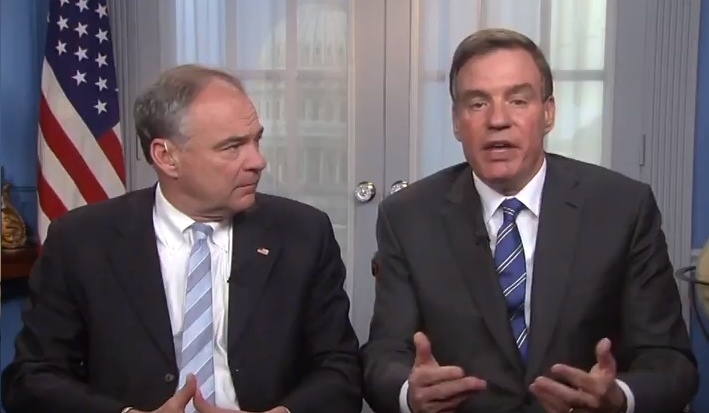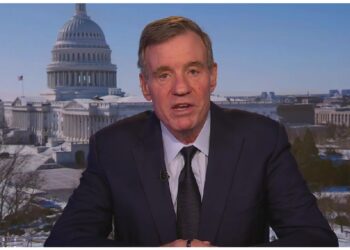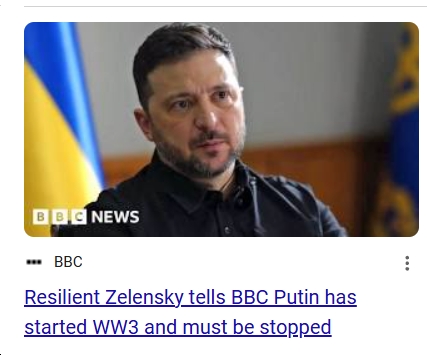See here for video and below for an interview this morning on “Full Court Press” with Sen. Mark Warner, in which he comments on the Australia nuclear submarine controversy, China, immigration, the debt ceiling, etc.
Sen. Mark Warner Highlights
On the Australia nuclear submarine controversy
Greta Van Susteren: Why did we do this deal?
Sen. Mark Warner (D-Va.): Well, we have continued to increase our relations with Australia, both under President Trump and under President Biden. We’ve put more emphasis on the so-called quad, which is India, Japan, Australia, and the UK. And the Australian government, frankly, is in certain areas years ahead of us in terms of dealing with the challenges and the threat from China. China has interfered more in their economy, they have tried to, frankly, influence some of their elections. So I think Australia is a great partner and the so-called AUKUS Deal is supposed to be beyond just the issue of submarines. It’s supposed to be a general collaboration deal, and having the UK, Australia, they’re both members of the Five Eyes, our closest intelligence-sharing partners.
Sen. Mark Warner (D-Va.): Now, the failure to notify France, I think that was a big mistake. I think, from what I know today, the assumption was that the Australians, since they had the deal with the French, there was something, a contract, that they had signed with the French back in 2015, 2016. And what I’ve learned since this was announced was that it was very public in Australia that Australia was not happy with the contract. The French were over budget, that they weren’t meeting the needs. But clearly, in a Biden administration that is about reinvigorating NATO and our alliances, this was not handled correctly, even if it was Australia’s responsibility to tell the French.
Greta Van Susteren: Did we cut this deal, for lack of a better word to describe, because it was a good bargain for us or that we’re trying to help Australia? Or is it because we want Australia to have those nuclear subs that they can basically sit in the China Sea? They’re stealth, they can stay there for a long time, they don’t need air like a conventional sub. I mean, what was our motive?
Sen. Mark Warner (D-Va.): Well, Greta, I think it was all the things you just mentioned. I think it was national security, I think it was the interest of stronger ties with Australia. We have a military presence in Australia. That relationship is strengthened. And it was giving Australia more tools. Australia is so much more under the potential thumb of China.
Sen. Mark Warner (D-Va.): I think it made sense, but again … France has been our longest ally since the founding of our nation and we have to be, I think, careful on that relationship. Although the more facts I see, the more it has appeared that the French, I think, did know that the Australians were unhappy with how the deal had been proceeding.
On the Biden administration’s relationship with U.S. allies
Greta Van Susteren: “Well, President Biden ran on the fact that he wanted to talk to our allies and them back in the fold, so to speak. Accusing the Trump administration of alienating them somewhat, most specifically the European allies. But we have this problem with the submarine deal and France, and before that, this past summer we had the evacuation from Afghanistan as well as shutting down the Bagram Air Force Base without giving anybody notice. So the idea is that are we really working with our allies more?”
Sen. Mark Warner (D-Va.): “I think it is absolutely critical that we have stronger, more open relationships with our allies. When our allies comment that these kind of actions they would expect from Trump, that was obviously the new low, we’ve got to do better. The challenge we have in terms of not only China’s rising military, but I think more importantly China’s theft of our intellectual property, not just American, but European, Japanese, Korean. China’s investments in issues like semiconductors. We can’t produce enough cars in America right now, because we don’t have access to enough semiconductors. We’ve got to build more facilities here in America.”
Sen. Mark Warner (D-Va.): “We have to do this in concert with our allies. And one of the areas that are particularly important is in technology development. As we try to deal with a Chinese economy that keeps growing where, frankly, Western companies go into China and give up their values too often because they don’t feel they can miss the Chinese market. We’ve got to be able to fight that on a multilateral basis. So I do think we all need to up our game.”
Sen. Mark Warner (D-Va.): “I would say from the intelligence standpoint, whether it’s the kerfuffle with France or with our European allies or with our Five Eyes, our intelligence relationships with all these nations has never been better. We are communicating on all these issues.”
On President Biden’s upcoming meeting with Chinese President Xi
Sen. Mark Warner (D-Va.): “I think we need to say to China and President Xi, “You are a great country.” I think we need to acknowledge that. And I think one of the things that we need, that have been improved since President Trump, is we need to be clearer. And maybe you don’t emphasize this with President Xi, but our beef is with the Communist party of China and President Xi, it’s not with the Chinese people or Chinese Americans as an excuse for kind of anti-Asian rhetoric.”
Sen. Mark Warner (D-Va.): “I do think we need to make clear to President Xi though, the technology state that they have created, which surveils the Chinese people, which cuts back on the freedom and discriminates against Muslims and Uyghurs, that cuts back on the freedom of the people of Hong Kong, we strongly disagree with it.”
Sen. Mark Warner (D-Va.): “We need to also ensure that we have freedom of navigation through the South China Sea. But we also need to say to China, ‘We can’t go back to a cold world mentality on issues like climate change. We need to work together.’”
On immigration and national security
Greta Van Susteren: “The fact that there’s such a large Haitian group down on our border right now, is that a matter of national security? Why are they there? And how is President Biden’s policy any different from President Trump’s on this?”
Sen. Mark Warner (D-Va.): “To see these images of literally thousands of people under this bridge and potentially more coming, I think there needs to be more clarity that folks, if they’re coming here illegally, we are a nation of laws, they will be returned. And I think taking some of these actions, for example, of sending some of these folks back, demonstrates that if you’re hearing on the internet or you’re hearing from your smuggler that if you come up you’re going to get in, I think we need to send a strong message that’s not the case, number one.”
Sen. Mark Warner (D-Va.): “Number two, I think we need to go ahead and invest in more immediate adjudication at the border. What happens is if you schedule somebody and they can disappear in America and their case doesn’t come up for five or six years, that makes no sense. There are legitimate refugee issues that need to be adjudicated. But putting some additional dollars, maybe not building a fourth-century fence, but actually increasing border security with 21st-century technology and an adjudication process that says you can turn folks around pretty quickly. The truth is, people who do get adjudicated, even central Americans, about 85% get sent back. But if you’ve got a five-year timeline, people don’t ever get adjudicated. They disappear into the country. Let’s make that adjudication process work at the border.”
Sen. Mark Warner (D-Va.): “And I do think it is an enormous challenge because what we also have in place is there’s not an employer I know in Virginia that’s not looking for additional workers. And so having a rational immigration process, whether we reform the so-called temporary protective service, whether we have… I believe very strongly in giving the dreamers a right to stay in this country, but also having a real guest worker program is important as well.”
Greta Van Susteren: “When is this ever going to happen that we actually will get these things handled? Or are we just going to keep kicking the can down the street?”
Sen. Mark Warner (D-Va.): “That’s a very fair question. I can tell you that I put my vote where my thoughts were. I joined John McCain in the bipartisan group. We got, I think, 68 votes on a broad immigration reform bill back, I think, 2011, 2012, somewhere in that timeframe. It couldn’t get through the then, I think Republican, controlled House.”
Sen. Mark Warner (D-Va.): “But we do need a little bit of disarmament here. We may not be able to be as comprehensive as we hoped, but we ought to go ahead and take on TPS, we ought to go ahead and take on the Dreamers. We ought to go ahead and make sure we’ve got an appropriate workforce. We need to make sure we still have some of the best and brightest talent in the world come to this country. But that is going to require partners on the Republican side. Not 5, 6, 7, 8, but it’s going to require… You can’t do immigration reform if you’re saying we’re going to count on 50 Democrats and see if we can beg to get 10 Republicans. This is a problem that both parties need to come to grips with. The business community who is desperate for workers needs to weigh in more firmly.”
On the debt ceiling and national security
Greta Van Susteren: “Is the raising of the debt limit a national security issue? Is getting a huge debt also a national security risk to us? Are they both a big problem for us?”
Sen. Mark Warner (D-Va.): “Absolutely. And neither political party has any kind of clean hands on the national debt. Years ago, I was very much involved in what was called the Simpson-Bowles Plan. It was my first gang, gang of six to try to take that on. We failed miserably. The debt’s gone up now to $27 trillion. But this debt limit, which is a totally legal fiction, it’s like giving an irresponsible politician a hand grenade and saying, “Pull the pin.” This debt limit is basically saying, ‘Should we go ahead and pay the bills for money we’ve already spent?’ This is not about future spending. This is about paying the money that was spent under President Trump. And I voted for many of these things in COVID. I’m not saying it was all his responsibility, but now it is more than a little bit hypocritical for leader McConnell to say, ‘Well, we’re not going to do anything to help even though the Democrats helped under President Trump.’”
Sen. Mark Warner (D-Va.): “And it is a national security issue for two reasons. First, if we were to suddenly, with all that’s going on, mess with the full faith and credit in the United States and undermine America’s financial standing, what would it do? Two things. One, it would raise interest rates immediately. And when we’ve got $27 trillion in debt, if interest rates go up one point that adds another $200 billion that the government has to pay to service that debt every year. That is a $2 trillion spending program over 10 years that we get nothing back.”
Sen. Mark Warner (D-Va.): “Second, for any American messing with the full faith and credit in the United States means Medicare checks may not go back out, military members may not be paid, your credit card rates are going to go up, your mortgage rates are going to go up. This is a national security self-imposed harm. And I just do not believe at the end of the day that responsible leaders will let it happen. But it is crazy to go through this gamesmanship. We ought to get rid of this item for future presidents, Democrat or Republican, whomever. And failure to do so allows that irresponsible politician to always pull the pin.”
Greta Van Susteren: “But is it a little bit of gamesmanship? The funding bill now that would give government funding until sometime in December also has a provision in it that it would suspend the debt ceiling until right after the midterms. When I read that, I think, ‘Okay, no one wants to face the music on this in terms of being reelected in the midterms, so the huge issue will come after everybody’s been reelected.’”
Sen. Mark Warner (D-Va.): “Greta, every time that I’ve been here, and it didn’t matter Democrats or Republicans when you raise the debt ceiling, you always raise it for about two to three years and you always make it after the next election. Let’s hold us all accountable when we actually commit the dollars, not after the fact when we say, ‘All right, we got to pay our credit card bill.’ This was a bill that was a law that was put in place in 1917. It serves no real purpose other than creating these political cliffs where, as we saw back in 2011 when we got close to that cliff and America’s debt rating almost got downgraded, you want to hold folks accountable. Don’t have them spend on the front end. Don’t say we’re going to suddenly, after the fact, say we’re not going to pay our bills. That’s not what a responsible country does.”






![Thursday News: “Europe draws red line on Greenland after a year of trying to pacify Trump”; “ICE Agent Kills Woman, DHS Tells Obvious, Insane Lies About It”; “Trump’s DOJ sued Virginia. Our attorney general surrendered”; “Political domino effect hits Alexandria as Sen. Ebbin [to resign] to join Spanberger administration”](https://bluevirginia.us/wp-content/uploads/2026/01/montage010826.jpg)











